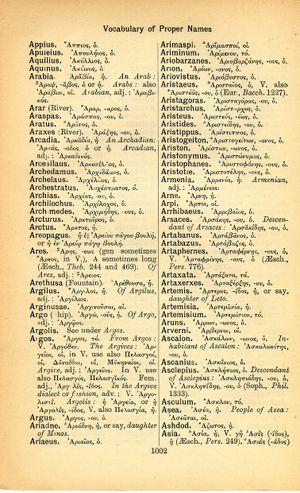Artemisia: Difference between revisions
From LSJ
Έγ', ὦ ταλαίπωρ', αὐτὸς ὧν χρείᾳ πάρει. Τὰ πολλὰ γάρ τοι ῥήματ' ἢ τέρψαντά τι, ἢ δυσχεράναντ', ἢ κατοικτίσαντά πως, παρέσχε φωνὴν τοῖς ἀφωνήτοις τινά –> Wretched brother, tell him what you need. A multitude of words can be pleasurable, burdensome, or they can arouse pity somehow — they give a kind of voice to the voiceless.
(D_1) |
(Gf-D_1) |
||
| Line 1: | Line 1: | ||
{{WoodhouseENELnames | {{WoodhouseENELnames | ||
|Text=[[File:woodhouse_1002.jpg|thumb|link= | |Text=[[File:woodhouse_1002.jpg|thumb | ||
|link={{filepath:woodhouse_1002.jpg}}]]Ἀρτεμισία, ἡ. | |||
}} | }} | ||
{{Lewis | {{Lewis | ||
Revision as of 07:28, 14 August 2017
English > Greek (Woodhouse)
Ἀρτεμισία, ἡ.
Latin > English (Lewis & Short)
Artĕmĭsĭa: ae, f., = Ἄρτεμισία.
I Wife of King Mausolus, in Caria, to whom, after his death, she built the renowned Mausoleum, Gell. 10, 18.—
II artĕmĭsĭa, ae, f., the plant mugwort, Plin. 25, 7, 36, § 73; App. Herb. 10.
Latin > French (Gaffiot 2016)
(2) Artĕmīsĭa, æ, f.,
1 Artémise [femme de Mausole, reine de Carie] : Cic. Tusc. 3, 75 ; Gell. 10, 18, 1
2 île de la mer Tyrrhénienne : Plin. 3, 81.

